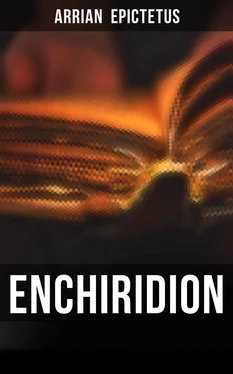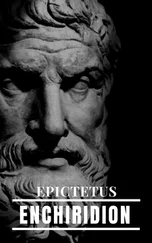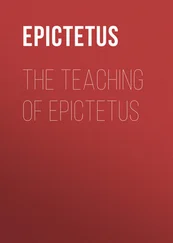But you travel to Olympia to behold the work 1of Pheidias, and each of you regards it as a misfortune to die without seeing such sights; yet when there is no need to travel at all, but where Zeus is already, and is present in his works, will you not yearn to behold these works and know them? 25Will you decline, therefore, to perceive either who you are, or for what you have been born, or what that purpose is for which you have received sight?—But some unpleasant and hard things happen in life.—And do they not happen at Olympia? Do you not swelter? Are you not cramped and crowded? Do you not bathe with discomfort? Are you not drenched whenever it rains? Do you not have your fill of tumult and shouting and other annoyances? But I fancy that you hear and endure all this by balancing it off against the memorable character of the spectacle. Come, have you not received faculties that enable you to bear whatever happens? Have you not received magnanimity? Have you not received courage? Have you not received endurance? And what care I longer for anything that may happen, if I be magnanimous? What shall perturb me, or trouble me, or seem grievous to me? Shall I fail to use my faculty to that end for which I have received it, but grieve and lament over events that occur?
30"Yes, but my nose is running." What have you hands for, then, slave? Is it not that you may wipe your nose? "Is it reasonable, then, that there should be running noses in the world?"—And how much better it would be for you to wipe your nose than to find fault! Or what do you think Heracles would have amounted to, if there had not been a lion like the one which he encountered, and a hydra, and a stag, and a boar, and wicked and brutal men, whom he made it his business to drive out and clear away? And what would he have been doing had nothing of the sort existed? Is it not clear that he would have rolled himself up in a blanket and slept? In the first place, then, he would never have become Heracles by slumbering away his whole life in such luxury and ease; but even if he had, of what good would he have been? What would have been the use of those arms of his and of his prowess in general, and his steadfastness and nobility, had not such circumstances and occasions roused and exercised him? 35What then? Ought he to have prepared these for himself, and sought to bring a lion into his own country from somewhere or other, and a boar, and a hydra? This would have been folly and madness. But since they did exist and were found in the world, they were serviceable as a means of revealing and exercising our Heracles.
Come then, do you also, now that you are aware of these things, contemplate the faculties which you have, and, after contemplating, say: "Bring now, O Zeus, what difficulty Thou wilt; for I have an equipment given to me by Thee, and resources wherewith to distinguish myself by making use of the things that come to pass," But no, you sit trembling for fear something will happen, and lamenting, and grieving, and groaning about other things that are happening. And then you blame the gods! For what else can be the consequence of so ignoble a spirit but sheer impiety? 40And yet God has not merely given us these faculties, to enable us to bear all that happens without being degraded or crushed thereby, but—as became a good king and in very truth a father—He has given them to us free from all restraint, compulsion, hindrance; He has put the whole matter under our control without reserving even for Himself any power to prevent or hinder. Although you have these faculties free and entirely your own, you do not use them, nor do you realize what gifts you have received, and from whom, but you sit sorrowing and groaning, some of you blinded toward the giver himself and not even acknowledging your benefactor, and others,—such is their ignoble spirit—turning aside to fault-finding and complaints against God. And yet, though I can show you that you have resources and endowment for magnanimity and courage, do you, pray, show me what resources you have to justify faultfinding and complaining!
1.The famous gold and ivory statue of Zeus.
Chapter VII.
Of the use of equivocal premisses, hypothetical arguments and the like
Table of Contents
Most men are unaware that the handling of arguments which involve equivocal and hypothetical premisses, and, further, of those which derive syllogisms by the process of interrogation, and, in general, the handling of all such arguments, 1has a bearing upon the duties of life. For our aim in every matter of inquiry is to learn how the good and excellent man may find the appropriate course through it and the appropriate way of conducting himself in it. Let them say, then, either that the good man will not enter the contest of question and answer, or that, once he has entered, he will be at no pains to avoid conducting himself carelessly and at haphazard in question and answer; or else, if they accept neither of these alternatives, they must admit that some investigation should be made of those topics with which question and answer are principally concerned.
5For what is the professed object of reasoning? To state the true, to eliminate the false, to suspend judgement in doubtful cases. Is it enough, then, to learn this alone?—It is enough, says one.—Is it, then, also enough for the man who wants to make no mistake in the use of money to be told the reason why you accept genuine drachmas and reject the counterfeit?—It is not enough.—What, then, must be added to this? Why, what else but the faculty that tests the genuine drachmas and the counterfeit and distinguishes between them? Wherefore, in reasoning also the spoken word is not enough, is it? On the contrary, is it not necessary to develop the power of testing the true and the false and the uncertain and of distinguishing between them?—It is necessary.—What else besides this is proposed in reasoning? Pray accept the consequence of what you have properly granted. 10Come, is it enough, then, in this case also merely to know that this particular thing is true? It is not enough, but one must learn in what way a thing follows as a consequence upon certain other things, and how sometimes one thing follows upon one, and at other times upon several conjointly. Is it not, then, necessary that a man should also acquire this power, if he is to acquit himself intelligently in argument, and is himself not only to prove each point when he tries to prove it, but also to follow the argument of those who are conducting a proof, and is not to be misled by men who quibble as though they were proving something? There has consequently arisen among us, and shown itself to be necessary, a science which deals with inferential arguments and with logical figures and trains men therein.
But of course there are times when we have with sound reasoning granted the premisses, and the inference from them is so-and-so; and, in spite of its being false, it is none the less the inference. What, then, should I do? Accept the fallacy? 15And how is that possible? Well, should I say, "It was not sound reasoning for me to grant the premisses"? Nay, but this is not permissible either. Or, "This does not follow from what has been granted"? But that is not permissible, either. What, then, must be done in these circumstances? Is it not this, that the fact of having borrowed is not enough to prove that one is still in debt, but we must add the circumstance that one abides by the loan—that is, has not paid it—and just so our having once granted the premisses is not enough to compel us to accept the inference, but we must abide by our acceptance of the premisses? And what is more, if the premisses remain until the end what they were when they were granted, there is every necessity for us to abide by our acceptance of them, and to allow the conclusion that has been drawn from them; 2. . . for from our point of view and to our way of thinking this inference does not now result from the premisses, since we have withdrawn from our previous assent to the premisses. 20It is necessary, therefore, to enquire into premisses of this kind and into such change and equivocal modification of them, whereby, at the very moment the question is put, or the answer made, or the deduction drawn, or at some other similar stage in the argument, the premisses take on modified meanings and give occasion to the unthinking to be disconcerted, if they do not see what follows in consequence. Why is it necessary? In order that in this matter we may not behave unsuitably, nor at haphazard, nor confusedly.
Читать дальше












